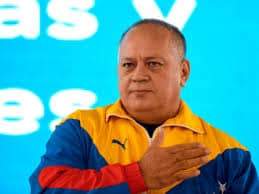Top Venezuelan Socialist on Rigged Election: ‘Those Who Don’t Vote, Don’t Eat’

Venezuelan socialist lawmaker, television host, and suspected drug lord Diosdado Cabello threatened Venezuelans with starvation on Monday if they did not vote in Sunday’s legislative elections.
The Organization of American States (OAS) preemptively urged world states not to accept the results of the December 6 elections last month, citing the totally unfree and unfair circumstances under which the elections are taking place. Dictator Nicolás Maduro has placed cronies at the head of the nation’s Electoral Commission, which counts votes, to ensure that his candidates will take over the National Assembly, the federal legislature. The National Assembly has been in the hands of the socialist opposition since the 2015 elections, the last in the country considered to have accurately represented the will of the people.
In response to the 2015 elections, Maduro unconstitutionally created a parallel legislature full of socialist cronies, including his wife and son, that he empowered to write laws. Diosdado Cabello is the head of that illegal legislature and is running for a seat in the National Assembly in the December 6 elections.
The portly Cabello made his threat following the release of a poll predicting record-low turnout in the election.
“Women will be at the forefront of the battle, I know that things are this way. I know that it’s the women who will wake up nice and early and say at home, it’s time to get up … to vote,” Cabello narrated. “And, of course, whoever doesn’t vote, doesn’t eat. There’s no food for those who don’t vote. I don’t know. Those who don’t vote, don’t eat; they get put in quarantine with no eating.”
The most charitable interpretation of Cabello’s words is a sexist one: that socialist women would not cook for their husbands if they do not vote in the election and that, apparently, these men would starve without women to cook for them.
The reference to “quarantines” suggests a threat, however. In response to the Chinese coronavirus pandemic, the Maduro regime confiscated deteriorated motels and turned them into prisons to house suspected coronavirus patients. Those trapped in the buildings said they were largely prevented from accessing food, kept in “unsanitary” conditions, and received barely any health care outside of regular temperature checks.
The more common interpretation of Cabello’s words is that the Maduro regime will not give much-needed food rations to people who do not participate in its fraudulent election. Venezuela has endured at least five years of major food shortages under Maduro that has resulted in the normalizing of digging in piles of garbage looking for edible pieces and fighting in supermarkets for the little food supplies available. The mass food shortages and their related weight loss are known in Venezuela as the “Maduro diet.”
The Spanish newspaper ABC noted that many Venezuelans now live on something known as the CLAP (Local Committees for Supply and Production). Socialists distribute CLAP boxes — often containing rancid milk, insect-ridden rice, and other barely edible products — to allies in poor communities, the only alternative in many cases to starving. Maduro put the military, which is loyal to him and Cabello despite Maduro’s illegitimacy as president since 2019, in charge of the nation’s food supply in 2016.
Maduro celebrated his birthday last week with a lavish party at the presidential palace, Miraflores, featuring a large cake designed in the colors of the Venezuelan flag. Also last week, reports surfaced of inmates in a Venezuelan prison killing and eating a guard’s Rottweiler to fend off starvation.
According to ABC, an opposition lawmaker, Delsa Solórzano, said in a public statement that she would take footage of Cabello’s remarks to the International Criminal Court (ICC) at The Hague as evidence of crimes against humanity and potential genocide, given that the tactic targets ethnic Venezuelans exclusively.
Con el Mazo Dando (“hitting with the mallet”), Cabello’s television program, covered his public appearance Monday in Bolívar state in various articles, none of them quoting his threat to starve non-voters. The show’s editors chose other quotes, such as his declaration that Venezuelans are “rebels, revolutionaries, socialists, anti-imperialists, and profoundly chavistas.”
Cabello also reportedly referred to the election as “the people’s revenge,” without specifying against whom.
Venezuelans appear highly likely to sit out the election on Sunday after a record-low turnout in the last election on May 20, 2018. Maduro won that election after banning non-Marxist candidates from running for president and intimidating Venezuelans through threats at work and other venues.
The Venezuelan polling firm Meganálisis published a survey this week that found 65 percent of Venezuelans were not planning on voting on Sunday. Of those who said they might vote, so few said they had certainty in that claim that Meganálisis is predicting a 13.75 percent turnout.
Maduro claimed that 46 percent of Venezuelans voted in 2018, the lowest recorded number in the history of the country.
Photo:MATIAS DELACROIX/AFP/Getty Images
Link: https://www.breitbart.com/latin-america/2020/12/01/top-venezuelan-socialist-rigged-election-those-who-dont-vote-dont-eat/











